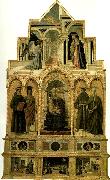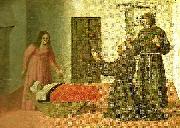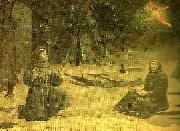Wholesale Oil Painting No Minimum |
|||||||||||
|
|
|||||||||||

|
|||||||||||
|
|
|
||||||||
Piero della FrancescaItalian Early Renaissance Painter, ca.1422-1492 Italian painter and theorist. His work is the embodiment of rational, calm, monumental painting in the Italian Early Renaissance, an age in which art and science were indissolubly linked through the writings of Leon Battista Alberti. Born two generations before Leonardo da Vinci, Piero was similarly interested in the scientific application of the recently discovered rules of perspective to narrative or devotional painting, especially in fresco, of which he was an imaginative master; and although he was less universally creative than Leonardo and worked in an earlier idiom, he was equally keen to experiment with painting technique. Piero was as adept at resolving problems in Euclid, whose modern rediscovery is largely due to him, as he was at creating serene, memorable figures, whose gestures are as telling and spare as those in the frescoes of Giotto or Masaccio. His tactile, gravely convincing figures are also indebted to the sculpture of Donatello, an equally attentive observer of Classical antiquity. In his best works, such as the frescoes in the Bacci Chapel in S Francesco, Arezzo, there is an ideal balance between his serene, classical compositions and the figures that inhabit them, the whole depicted in a distinctive and economical language. In his autograph works Piero was a perfectionist, creating precise, logical and light-filled images (although analysis of their perspective schemes shows that these were always subordinated to narrative effect). However, he often delegated important passages of works (e.g. the Arezzo frescoes) to an ordinary, even incompetent, assistant. |
||||||||
|
|
||||||||
polyptych of saint anthony
polyptych of saint anthony Painting ID:: 64966 |
perugia, galleria nazionale dell'umbria
oil and tempera on poplar panel
338 by 230cm
se perugia, galleria nazionale dell'umbria oil and tempera on poplar panel 338 by 230cm se |
|||||||
|
|
||||||||
Piero della FrancescaItalian Early Renaissance Painter, ca.1422-1492 Italian painter and theorist. His work is the embodiment of rational, calm, monumental painting in the Italian Early Renaissance, an age in which art and science were indissolubly linked through the writings of Leon Battista Alberti. Born two generations before Leonardo da Vinci, Piero was similarly interested in the scientific application of the recently discovered rules of perspective to narrative or devotional painting, especially in fresco, of which he was an imaginative master; and although he was less universally creative than Leonardo and worked in an earlier idiom, he was equally keen to experiment with painting technique. Piero was as adept at resolving problems in Euclid, whose modern rediscovery is largely due to him, as he was at creating serene, memorable figures, whose gestures are as telling and spare as those in the frescoes of Giotto or Masaccio. His tactile, gravely convincing figures are also indebted to the sculpture of Donatello, an equally attentive observer of Classical antiquity. In his best works, such as the frescoes in the Bacci Chapel in S Francesco, Arezzo, there is an ideal balance between his serene, classical compositions and the figures that inhabit them, the whole depicted in a distinctive and economical language. In his autograph works Piero was a perfectionist, creating precise, logical and light-filled images (although analysis of their perspective schemes shows that these were always subordinated to narrative effect). However, he often delegated important passages of works (e.g. the Arezzo frescoes) to an ordinary, even incompetent, assistant. |
||||||||
|
|
||||||||
|
|
polyptych of saint anthony
polyptych of saint anthony Painting ID:: 64968 |
the miracle of st anthony
se the miracle of st anthony se |
||||||
|
|
||||||||
Piero della FrancescaItalian Early Renaissance Painter, ca.1422-1492 Italian painter and theorist. His work is the embodiment of rational, calm, monumental painting in the Italian Early Renaissance, an age in which art and science were indissolubly linked through the writings of Leon Battista Alberti. Born two generations before Leonardo da Vinci, Piero was similarly interested in the scientific application of the recently discovered rules of perspective to narrative or devotional painting, especially in fresco, of which he was an imaginative master; and although he was less universally creative than Leonardo and worked in an earlier idiom, he was equally keen to experiment with painting technique. Piero was as adept at resolving problems in Euclid, whose modern rediscovery is largely due to him, as he was at creating serene, memorable figures, whose gestures are as telling and spare as those in the frescoes of Giotto or Masaccio. His tactile, gravely convincing figures are also indebted to the sculpture of Donatello, an equally attentive observer of Classical antiquity. In his best works, such as the frescoes in the Bacci Chapel in S Francesco, Arezzo, there is an ideal balance between his serene, classical compositions and the figures that inhabit them, the whole depicted in a distinctive and economical language. In his autograph works Piero was a perfectionist, creating precise, logical and light-filled images (although analysis of their perspective schemes shows that these were always subordinated to narrative effect). However, he often delegated important passages of works (e.g. the Arezzo frescoes) to an ordinary, even incompetent, assistant. |
||||||||
|
|
||||||||
|
|
polyptych of saint anthony
polyptych of saint anthony Painting ID:: 64969 |
the stigmatisation of st francis
se the stigmatisation of st francis se |
||||||
|
|
||||||||
|
Piero della Francesca Italian Early Renaissance Painter, ca.1422-1492 Italian painter and theorist. His work is the embodiment of rational, calm, monumental painting in the Italian Early Renaissance, an age in which art and science were indissolubly linked through the writings of Leon Battista Alberti. Born two generations before Leonardo da Vinci, Piero was similarly interested in the scientific application of the recently discovered rules of perspective to narrative or devotional painting, especially in fresco, of which he was an imaginative master; and although he was less universally creative than Leonardo and worked in an earlier idiom, he was equally keen to experiment with painting technique. Piero was as adept at resolving problems in Euclid, whose modern rediscovery is largely due to him, as he was at creating serene, memorable figures, whose gestures are as telling and spare as those in the frescoes of Giotto or Masaccio. His tactile, gravely convincing figures are also indebted to the sculpture of Donatello, an equally attentive observer of Classical antiquity. In his best works, such as the frescoes in the Bacci Chapel in S Francesco, Arezzo, there is an ideal balance between his serene, classical compositions and the figures that inhabit them, the whole depicted in a distinctive and economical language. In his autograph works Piero was a perfectionist, creating precise, logical and light-filled images (although analysis of their perspective schemes shows that these were always subordinated to narrative effect). However, he often delegated important passages of works (e.g. the Arezzo frescoes) to an ordinary, even incompetent, assistant. polyptych of saint anthony the stigmatisation of st francis se |
||||||||
|
|
||||||||
|
Prev Next
|
||||||||
|
|
||||||||
|
Related Paintings to Piero della Francesca :. |
||||||||
|
|
||||||||
|
CONTACT US |



